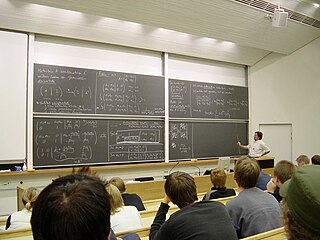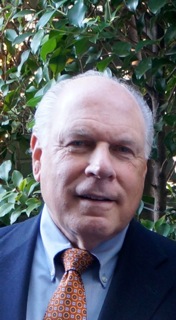
A child prodigy is defined in psychology research literature as a person under the age of ten who produces meaningful output in some domain at the level of an adult expert. The term is also applied more broadly to young people who are extraordinarily talented in some field.

Jacques Salomon Hadamard was a French mathematician who made major contributions in number theory, complex analysis, differential geometry and partial differential equations.

In contemporary education, mathematics education—known in Europe as the didactics or pedagogy of mathematics—is the practice of teaching, learning, and carrying out scholarly research into the transfer of mathematical knowledge.

New Mathematics or New Math was a dramatic but temporary change in the way mathematics was taught in American grade schools, and to a lesser extent in European countries and elsewhere, during the 1950s–1970s. Curriculum topics and teaching practices were changed in the U.S. shortly after the Sputnik crisis. The goal was to boost students' science education and mathematical skill to meet the technological threat of Soviet engineers, reputedly highly skilled mathematicians.

David Cyril Geary is a United States cognitive developmental and evolutionary psychologist with interests in mathematical learning and sex differences. He is currently a Curators’ Professor and Thomas Jefferson Fellow in the Department of Psychological Sciences and Interdisciplinary Neuroscience Program at the University of Missouri in Columbia, Missouri.
Abraham Nemeth was an American mathematician. He was Professor of Mathematics at the University of Detroit Mercy in Detroit, Michigan. Nemeth was blind and is known for developing Nemeth Braille, a system for blind people to read and write mathematics.
Julian Cecil Stanley was an American psychologist. He was an advocate of accelerated education for academically gifted children. He founded the Johns Hopkins University Center for Talented Youth (CTY), as well as a related research project, the Study of Mathematically Precocious Youth (SMPY), whose work has, since 1980, been supplemented by the Julian C. Stanley Study of Exceptional Talent (SET), which provides academic assistance to gifted children. Stanley was also widely known for his classic book, coauthored with Donald Campbell, on the design of educational and psychological research - Experimental and Quasi-experimental Designs for Research.
Mathematical anxiety, also known as math phobia, is anxiety about one's ability to do mathematics.

John Mighton, OC is a Canadian mathematician, author, and playwright.
Robert S. Siegler is an American psychologist and professor of psychology at Columbia University. He is a recipient of the American Psychological Association's 2005 Distinguished Scientific Contribution Award.
From kindergarten through high school, mathematics education in public schools in the United States has historically varied widely from state to state, and often even varies considerably within individual states. With the adoption of the Common Core Standards by 45 states, mathematics content across the country is moving into closer agreement for each grade level. Furthermore, the SAT, a standardized university entrance exam, has been reformed to better reflect the contents of the Common Core.
Maths Mansion is a British educational television series for school Years 4 to 6 that ran from 19 September 2001 to 26 March 2003. Produced by Channel 4 by Open Mind, It follows the adventures of "Bad Man" taking kids to his mansion, Maths Mansion. There, the kids learn and are tested on maths every week; if they pass the quiz, they get a "Maths Card".
Lee Vernon Stiff was an American mathematics education researcher; a professor in the Department of Science, Technology, Engineering, and Mathematics Education and the Associate Dean for Faculty and Academic Affairs in the College of Education at North Carolina State University; and the author of several mathematics textbooks. In his 72 years of living he wrote many books.
Modern elementary mathematics is the theory and practice of teaching elementary mathematics according to contemporary research and thinking about learning. This can include pedagogical ideas, mathematics education research frameworks, and curricular material.

Many scholars and policymakers have noted that the fields of science, technology, engineering, and mathematics (STEM) have remained predominantly male with historically low participation among women since the origins of these fields in the 18th century during the Age of Enlightenment.

Alfred S. Posamentier is an American educator and a lead commentator on American math and science education, regularly contributing to The New York Times and other news publications. He has created original math and science curricula, emphasized the need for increased math and science funding, promulgated criteria by which to select math and science educators, advocated the importance of involving parents in K-12 math and science education, and provided myriad curricular solutions for teaching critical thinking in math.
Computer-Based Math is an educational project started by Conrad Wolfram in 2010 to promote the idea that routine mathematical calculations should be done with a computer.

Jo Boaler is a British education author and Nomellini-Olivier Professor of Mathematics Education at the Stanford Graduate School of Education. Boaler is involved in promoting reform mathematics and equitable mathematics classrooms. She is the co-founder and faculty director of youcubed a Stanford centre that offers free mathematics education resources to teachers, students and parents. She is the author of nine books, including Limitless Mind (2019), Mathematical Mindsets (2016), What's Math Got To Do With It? (2009) and The Elephant in the Classroom (2010), all written for teachers and parents with the goal of improving mathematics education in both the US and UK.
Marian Small is a Canadian educational researcher, academic, author, and public speaker. She has co-authored mathematics textbooks used in Canada, Austria, and the United States, and is a proponent of a constructivist approach to mathematical instruction within K–12 classrooms.
Elham Kazemi is a mathematics educator and educational psychologist, the Geda and Phil Condit Professor in Math and Science Education in the College of Education of the University of Washington.








